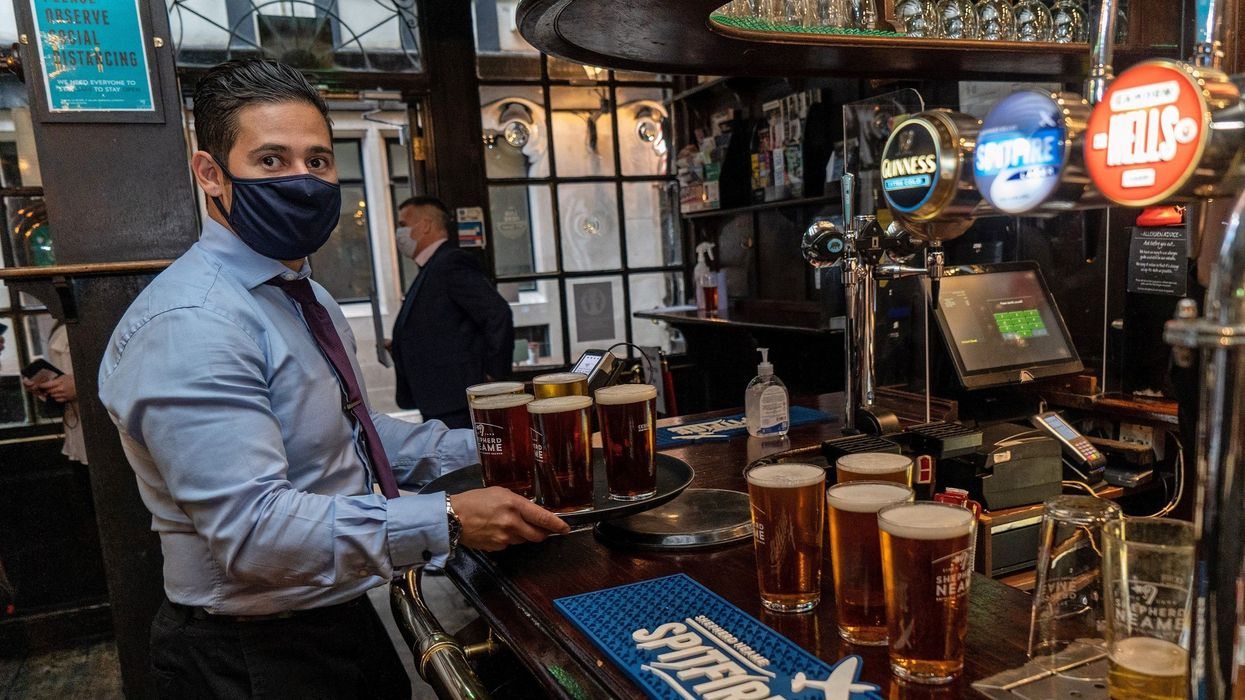Britain's pandemic-weary hospitality businesses have taken a fresh hit from soaring coronavirus cases fueled by the Omicron variant, as anxious customers curtail socialising and cancel bookings over the Christmas period.
Pubs, restaurants and bars -- already struggling after nearly two years of reduced revenues due to the pandemic -- now face lost income at typically the busiest and most valuable time of the year.
"Normally this is the biggest week of the year (and) it's completely crushed," Pascal Aussignac, chef and owner of five French restaurants in Britain, told AFP.
The UK government last week switched to its so-called "plan B" to deal with coronavirus, advising people to work from home if they can since Monday and mandating they wear masks in most indoor settings.
MPs also backed proposals Tuesday to introduce a Covid pass for people to access large-scale events.
It comes as cases double roughly every two days and health officials reported more than 93,000 new infections Friday, the third consecutive record daily tally.
"It looks like we have less people," said James Ross, co-founder of Badger Badger, a pub, eatery and daytime workspace in southeast London.
He added the business had seen a "significant" drop in income, with revenue down by 10 percent over the last week and 35 percent below his expectations for the pre-Christmas period.
Trade body UKHospitality's boss Kate Nicholls said hospitality sales have already plunged by more than a third over the past 10 days with 2 billion pounds ($2.7 billion, 2.4 billion euros) of trade already lost in December.
- 'What can we do?' -
Meanwhile, at the White Hart pub in east London, owner Patrick Mullighan revealed he had been forced to shutter his kitchen after his chef contracted Covid-19.
"It represents a lot of money," he said of the losses from the closure.
"I'm always worried but what can we do? You've got to carry on," said Mullighan.
Hospitality outlets have been left with little choice but to stay open in order for most to pay their rents.
Ross, who only opened Badger Badger in October 2020, said he felt "fortunate" to have agreed a "Covid clause" in its lease.
"We don't pay the rent if we have to close" due to the virus, he noted.
Aussignac is also in regular contact with the owners of his restaurants to discuss various issues, including the rents.
But without a return to greater government financial aid, "the problem will be the staff," he warned.
The government ended its costly scheme to support businesses with furloughed workers in September.
Critics argue that following numerous ominous warnings about Omicron and its dangers, this has created a lockdown by stealth without the necessary assistance from the finance ministry.
Aussignac said it felt like being "caught in a vice" between disappearing customers, post-Brexit recruitment problems and wage inflation as well as increasingly expensive European products.
He expects many bankruptcies in the absence of some form of renewed government support.
The chef would consider relocating at least one of his restaurants from central London to more residential areas better suited to the flexible working arrangements that have become more common.
But after 18 months of difficulties, he noted "we have no cash flow".
- 'Chaos of inaction' -
Ross fears that further restrictions, which could be introduced after Christmas, will further squeeze the sector.
Wales, for example, has just announced the closure of nightclubs from December 27.
Retailers are also suffering, with the owner of toy chain The Entertainer, Gary Grant, telling The Guardian the business had seen footfall drop by a fifth.
That followed a rise in UK retail sales in November, thanks to Black Friday and early Christmas shopping.
Meanwhile, aviation is another sector hit hard by the pandemic, with airlines and related operators suffering from a drop in short-term bookings following the reintroduction of some travel curbs and renewed uncertainty.
Finance Minister Rishi Sunak cut short a trip to Silicon Valley in California, meeting virtually with representatives of struggling industries on Thursday ahead of returning to London on Friday.
But there has been no announcement of renewed UK government aid of the kind seen earlier in the pandemic.
Welsh First Minister Mark Drakeford on Friday announced £60 million in support for affected businesses.
His Scottish counterpart Nicola Sturgeon has slammed Prime Minister Boris Johnson's "chaos of inaction" on Twitter.
"We must advise people to cut social contacts to a minimum... but then compensate businesses for the impact of fewer customers & support venues to cancel events if necessary," she added.




